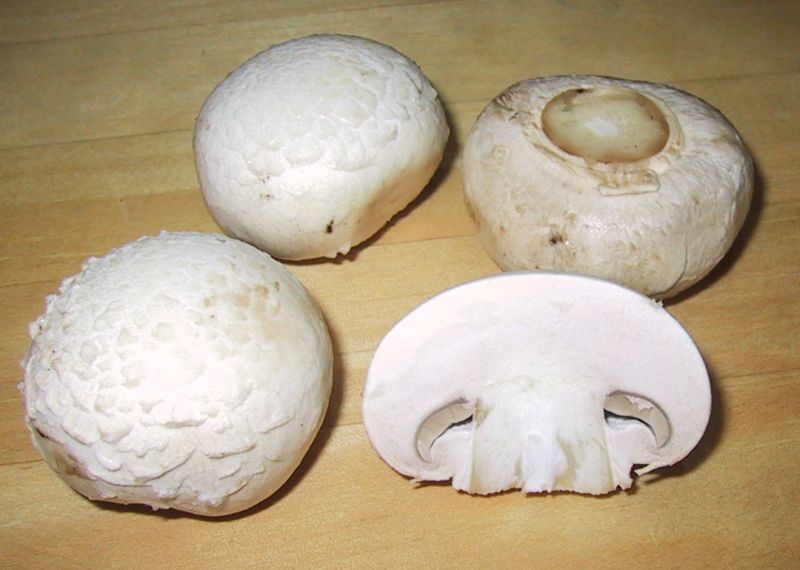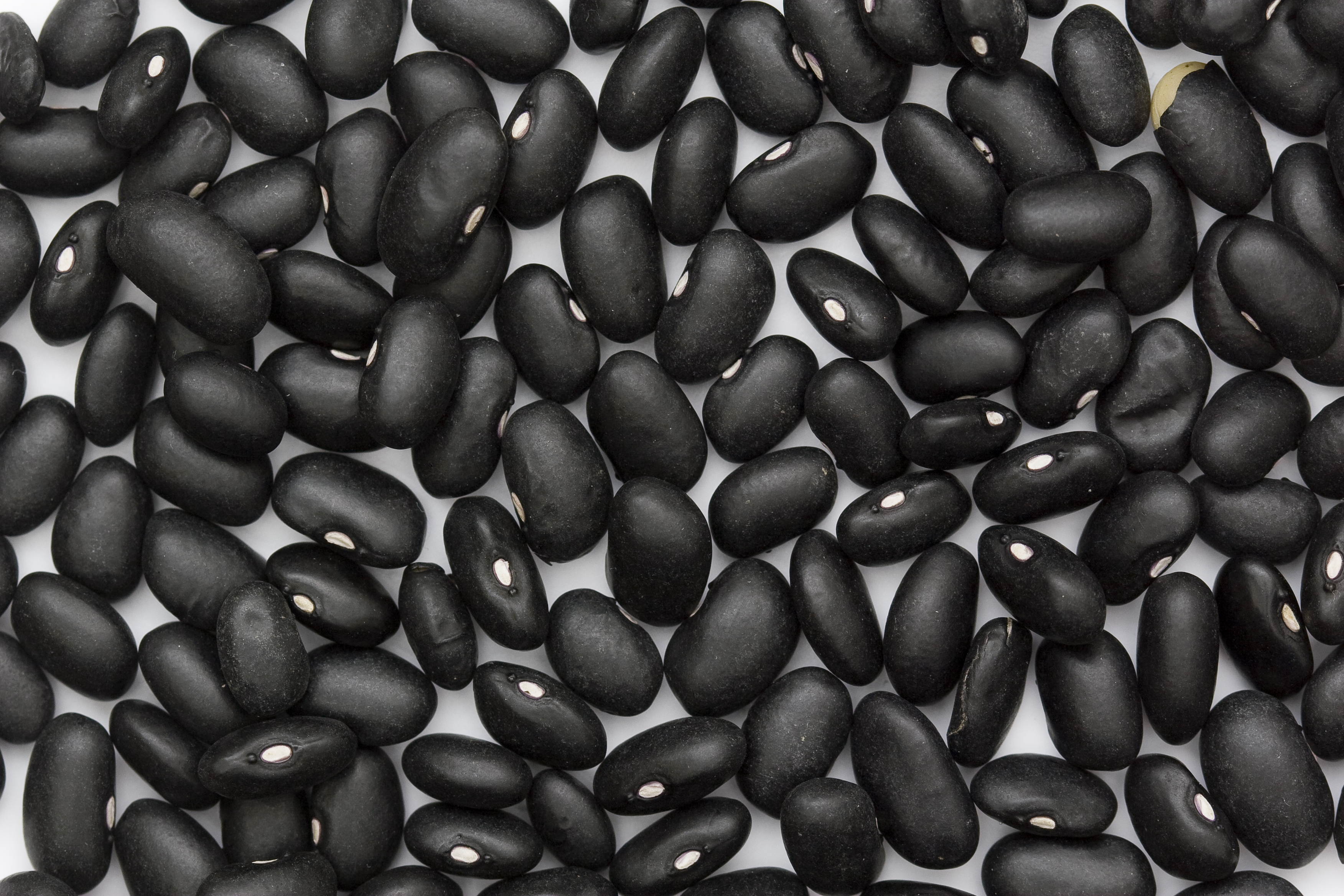White Mushroom vs. Black Beans
Nutrition comparison of White Mushroom and Black Beans
Ever wonder how your favorite foods stack up against each other in terms of nutrition?
We compared the nutritional contents of
white mushroom
versus
black beans
(100g each)
below using 2020 USDA and NIH data[1].
For a quick recap of significant nutrients and differences in white mushroom and black beans:
- Both white mushroom and black beans are high in potassium.
- Black bean has signficantly more calcium than white mushroom.
- Black bean is an excellent source of dietary fiber.
- White mushroom has 3.1 times less calories than black bean.
- White mushroom has 4 times less carbohydrates than black bean.
- White mushroom has more riboflavin, niacin, pantothenic acid and Vitamin B12, however, black bean contains more folate.
USDA sources for nutritional information: White Mushroom (Mushrooms, white, raw) and Black Beans (Beans, black turtle, mature seeds, canned) . Have a correction or suggestions? Shoot us an email.
Calories and Carbs
calories
White mushroom has 3.1 times less calories than black bean - white mushroom has 22 calories per 100 grams and black bean has 91 calories.
For macronutrient ratios, white mushroom is heavier in protein, much lighter in carbs and heavier in fat compared to black beans per calorie. White mushroom has a macronutrient ratio of 44:47:9 and for black beans, 26:71:3 for protein, carbohydrates and fat from calories.
Macro Ratios from Calories:
| White Mushroom | Black Beans | |
|---|---|---|
| Protein | 44% | 26% |
| Carbohydrates | 47% | 71% |
| Fat | 9% | 3% |
| Alcohol | ~ | ~ |
carbohydrates
White mushroom has 4 times less carbohydrates than black bean - white mushroom has 3.3g of total carbs per 100 grams and black bean has 16.6g of carbohydrates.
dietary fiber
Black bean is an excellent source of dietary fiber and it has 590% more dietary fiber than white mushroom - white mushroom has 1g of dietary fiber per 100 grams and black bean has 6.9g of dietary fiber.
sugar
White mushroom and black beans contain similar amounts of sugar - white mushroom has 2g of sugar per 100 grams and black bean has 0.23g of sugar.
Protein
protein
Black bean has 95% more protein than white mushroom - white mushroom has 3.1g of protein per 100 grams and black bean has 6g of protein.
Fat
saturated fat
Both white mushroom and black beans are low in saturated fat - white mushroom has 0.05g of saturated fat per 100 grams and black bean has 0.08g of saturated fat.
Vitamins
Vitamin C
White mushroom and black beans contain similar amounts of Vitamin C - white mushroom has 2.1mg of Vitamin C per 100 grams and black bean has 2.7mg of Vitamin C.
Vitamin A
Black beans and white mushroom contain similar amounts of Vitamin A - black bean has 1.2ug of Vitamin A per 100 grams and white mushroom does not contain significant amounts.
Vitamin D
White mushroom has more Vitamin D than black bean - white mushroom has 7iu of Vitamin D per 100 grams and black bean does not contain significant amounts.
Vitamin E
White mushroom and black beans contain similar amounts of Vitamin E - white mushroom has 0.01mg of Vitamin E per 100 grams and black bean has 0.62mg of Vitamin E.
Vitamin K
Black beans and white mushroom contain similar amounts of Vitamin K - black bean has 2.3ug of Vitamin K per 100 grams and white mushroom does not contain significant amounts.
The B Vitamins
White mushroom has more riboflavin, niacin, pantothenic acid and Vitamin B12, however, black bean contains more folate. Both white mushroom and black beans contain significant amounts of thiamin and Vitamin B6.
| White Mushroom | Black Beans | |
|---|---|---|
| Thiamin | 0.081 MG | 0.14 MG |
| Riboflavin | 0.402 MG | 0.12 MG |
| Niacin | 3.607 MG | 0.62 MG |
| Pantothenic acid | 1.497 MG | 0.184 MG |
| Vitamin B6 | 0.104 MG | 0.055 MG |
| Folate | 17 UG | 61 UG |
| Vitamin B12 | 0.04 UG | ~ |
Minerals
calcium
Black bean has signficantly more calcium than white mushroom - white mushroom has 3mg of calcium per 100 grams and black bean has 35mg of calcium.
iron
Black bean has 280% more iron than white mushroom - white mushroom has 0.5mg of iron per 100 grams and black bean has 1.9mg of iron.
potassium
Both white mushroom and black beans are high in potassium. White mushroom is very similar to black bean for potassium - white mushroom has 318mg of potassium per 100 grams and black bean has 308mg of potassium.
Omega-3 and Omega-6
omega 6s
Comparing omega-6 fatty acids, white mushroom has more linoleic acid than black bean per 100 grams.
| White Mushroom | Black Beans | |
|---|---|---|
| linoleic acid | 0.16 G | 0.068 G |
| Total | 0.16 G | 0.068 G |
Customize your serving size
The comparison below is by common portions, e.g. cups, packages. You can also see a more concrete comparison by weight at equal weight (by grams) comparison.
Note: The specific food items compared are: White Mushroom (Mushrooms, white, raw) and Black Beans (Beans, black turtle, mature seeds, canned) .
White Mushroom g
()
|
Daily Values (%) |
Black Beans g
()
|
|||||
|---|---|---|---|---|---|---|---|
| KCAL % |
|
5% | calories | 5% |
|
KCAL % | |
| G % |
|
5% | carbohydrates | 5% |
|
G % | |
| G % |
|
5% | dietary fiber | 5% |
|
G % | |
| G | 5% | sugar | 5% | G | |||
| G % |
|
5% | total fat | 5% |
|
G % | |
| G % |
|
5% | saturated fat | 5% |
|
G % | |
| G | 5% | monounsaturated fat | 5% | G | |||
| G | 5% | polyunsaturated fat | 5% | G | |||
| G | 5% | trans fat | 5% | G | |||
| MG | 5% | cholesterol | 5% | MG | |||
| MG % |
|
5% | sodium | 5% |
|
MG % | |
| 5% | Vitamins and Minerals | 5% | |||||
| UG % |
|
5% | Vitamin A | 5% |
|
UG % | |
| MG % |
|
5% | Vitamin C | 5% |
|
MG % | |
| IU % |
|
5% | Vitamin D | 5% |
|
IU % | |
| MG % |
|
5% | calcium | 5% |
|
MG % | |
| MG % |
|
5% | iron | 5% |
|
MG % | |
| MG % |
|
5% | magnesium | 5% |
|
MG % | |
| MG % |
|
5% | potassium | 5% |
|
MG % | |
| MG % |
|
5% | thiamin (Vit B1) | 5% |
|
MG % | |
| MG % |
|
5% | riboflavin (Vit B2) | 5% |
|
MG % | |
| MG % |
|
5% | niacin (Vit B3) | 5% |
|
MG % | |
| MG % |
|
5% | Vitamin B6 | 5% |
|
MG % | |
| MG % |
|
5% | pantothenic acid (Vit B5) | 5% |
|
MG % | |
| UG % |
|
5% | folate (Vit B9) | 5% |
|
UG % | |
| UG % |
|
5% | Vitamin B12 | 5% |
|
UG % | |
| MG % |
|
5% | Vitamin E | 5% |
|
MG % | |
| UG % |
|
5% | Vitamin K | 5% |
|
UG % | |
| G % |
|
5% | protein | 5% |
|
G % | |
| UG % |
|
5% | biotin (Vit B7) | 5% |
|
UG % | |
| MG % |
|
5% | choline | 5% |
|
MG % | |
| MG % |
|
5% | chlorine | 5% |
|
MG % | |
| UG % |
|
5% | chromium | 5% |
|
UG % | |
| MG % |
|
5% | copper | 5% |
|
MG % | |
| UG % |
|
5% | fluoride | 5% |
|
UG % | |
| UG % |
|
5% | iodine | 5% |
|
UG % | |
| MG % |
|
5% | manganese | 5% |
|
MG % | |
| UG % |
|
5% | molybdenum | 5% |
|
UG % | |
| MG % |
|
5% | phosphorus | 5% |
|
MG % | |
| UG % |
|
5% | selenium | 5% |
|
UG % | |
| MG % |
|
5% | zinc | 5% |
|
MG % | |
| G | 5% | Water | 5% | G | |||
| G | 5% | Starch | 5% | G | |||
| G | 5% | Alcohol | 5% | G | |||
FAQ
Does white mushroom or black beans contain more calories in 100 grams?White mushroom has 3.1 times less calories than black bean - white mushroom has 22 calories in 100g and black bean has 91 calories.
Is white mushroom or black beans better for protein?
Black bean has 100% more protein than white mushroom - white mushroom has 3.1g of protein per 100 grams and black bean has 6g of protein.
Does white mushroom or black beans have more carbohydrates?
By weight, white mushroom has 4 times fewer carbohydrates than black bean - white mushroom has 3.3g of carbs for 100g and black bean has 16.6g of carbohydrates.
Does white mushroom or black beans contain more potassium?
Both white mushroom and black beans are high in potassium. White mushroom is very similar to black bean for potassium - white mushroom has 318mg of potassium in 100 grams and black bean has 308mg of potassium.

